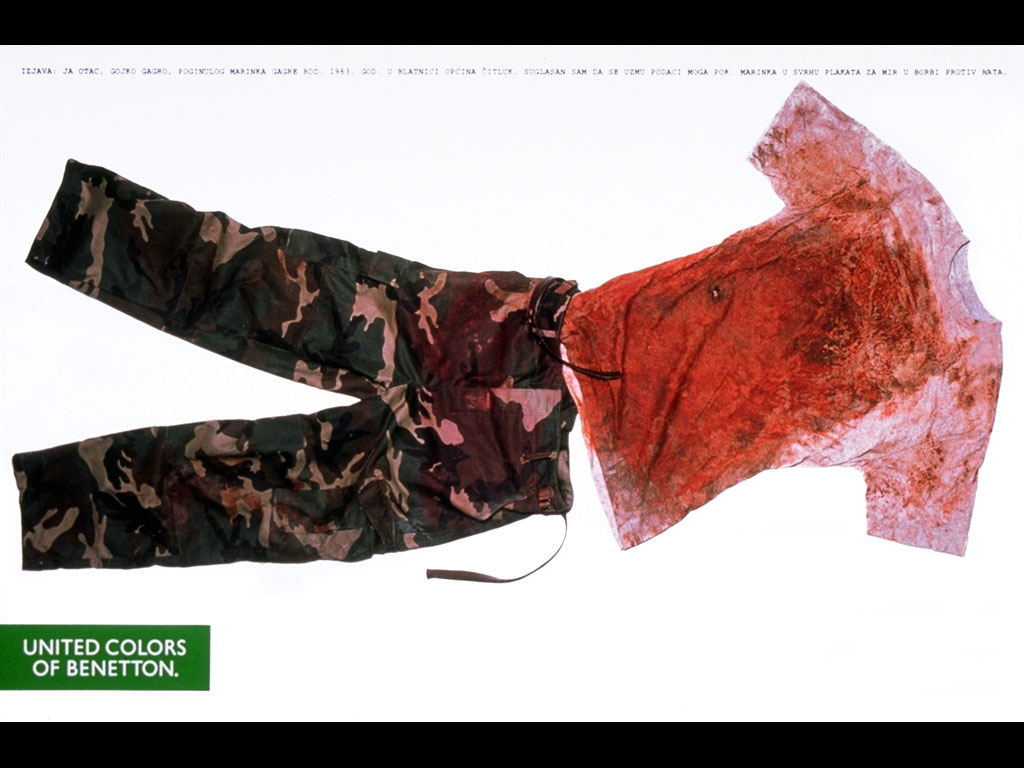The most fascinating aspect about the whole Benetton campaign is not the pushing of boundaries, the shocking tactics, the irreverence of Oliver Toscani... But the fact that after working for a fashion brand for all these years, he still wears god-awful glasses! Another fascinating fact is that the journalist Brad Wieners commenting here has completely forgotten to fact-check.
"And it's done more to raise consciousness about certain issues than public interest journalism. Example: His photographs of the army fatigues of a youth who lost his life in Bosnia, fatigues sent him by the youth's bereaved father."
Nope. Read up, dude. According to the book titled "Benetton, the family, the business,and the brand" about "Known soldier" it states:
"Gojko Gagro-the father, saw the image on the German newspaper Die Woche. Gagro confirmed that he had supplied photographs of his dead son, which were not used, and a statement, which was. Most emphatically he said that he had not supplied the bloodstained clothing which appeared in the image. He repeated that his son's clothes had been burned at the hospital where he died, adding that if they had not been burned, he would never have given them away:" It would have been like selling the legs of my son". Furthermore, he pointed out that his son had died from a shot to the head and not to the chest, as suggested by the bullet hole in Benetton's picture."
I know, it's "just" an article online, but that is the problem. Another ad myth is now turning into "fact" because reporters re-report without fact-checking. That can start to get really messy, down the line.
So where did this idea come from? Benetton's own press release, most likely. Back in 1994.
Let's read between the lines in an article written by Denise Smith Amos, in the Tampa Bay Times here.
The press release called him the Known Soldier.
The campaign is based on bloodstained clothes _ the ones Gagro supposedly wore that fateful day. Print ads and billboards featured up-close, stark photos of a blood-drenched T-shirt and combat fatigues, a bullet hole clearly visible in the chest area.
At the top of the ad, written in Serbo-Croatian, is a message from Gagro's father: "I, Gojko Gagro, father of the deceased Marinko Gagro, born in 1963, at Blizanci in the province of Citluk, would like that my son's name, and all that remains of him be used in the name of peace and against war."
Benetton's press release announcing the campaign explained, "Marinko's parents mourn him with the dignity of those who do not wish to forget. His clothes, pierced and contaminated by the violence of war, await an explanation."
Gagro's father awaits an explanation, too, on different questions: How did Benetton get those clothes and do they belong to his son?
In an interview with Die Woche, a German newspaper, Gojko Gagro said last week that he never gave Benetton the clothes or the permission to use them. In fact, Gojko Gagro said, he never saw his son's clothes and had assumed a hospital had burned them.
"To have given them away would have been like selling the legs of my son," the paper quoted him as saying. The Reuters wire service picked up the story and distributed it internationally.
Gagro said he remembers giving a Red Cross worker a picture of his son and the letter, because the worker had said someone was putting together an anti-war poster campaign. Gagro also noted that his son had died from a head wound, not a chest wound as indicated by the bullet hole in the T-shirt.
Outraged, a German human rights group asked the government to investigate whether Benetton violated international law by allegedly exploiting the Bosnian war for profit, Reuters reported.
On Friday Peter Fressola, a Benetton spokesman, explained during a telephone interview from New York that there had been some miscommunication. It appears that Benetton's representative in Trieste, Italy, had obtained the clothes from the Red Cross and was informed _ incorrectly _ that the family knew they would be used in an anti-war ad campaign.

